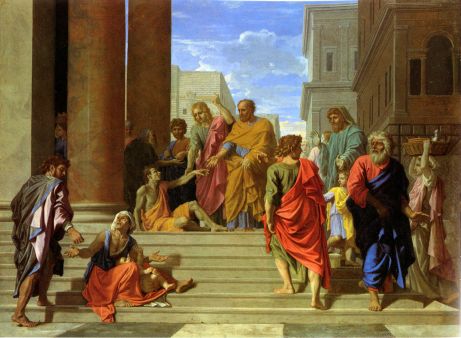Very truly I tell you, whoever believes in me will do the works I have been doing, and they will do even greater things than these, because I am going to the Father. – John 14:12
I’m trying to imagine being one of the 12 disciples and hearing this. They had witnessed Jesus performing signs and wonders: Healing the sick, raising the dead, multiplying food and controlling the forces of nature.
That’s a pretty high bar, and Jesus was being serious in John 14:12. These greater works were related to both Jesus’ going to the Father, and the Holy Spirit’s coming (John 16:7). When the disciples received the Holy Spirit, they healed the lame, the blind, the paralyzed, and the sick, just like Jesus. They cast out demons. They spoke in unknown languages, were unharmed by poisonous snakes, and the ground shook when they preached. Even their shadows, and the handkerchiefs they touched produced miracles.

Peter and John Healing the Lame Man, Nicolas Poussin
These works of the Holy Spirit are described throughout the book of Acts, as the church took root and grew rapidly (e.g. 2:4; 5:15; 8:39; 9:36-42; 19:12; 20:9-12; 28:3-6).
What if Jesus’ words were also meant for the modern Church? Not just his theology and ethics, but also His promises that His people will perform signs and miracles through the power of the Holy Spirit? His words in John 14:12 seem incredible to me, but not just because they test my faith in the supernatural and mess with my theology. They also force me to examine my own weaknesses, sins and shortsightedness.
I have seen churches use modern technology, management techniques, and creative programming, and they can produce positive results. They can also offer security and predictability. They allow the programmers a certain amount of control over the outcomes.
Is this what spirit-filled ministry is supposed to do? The Holy Spirit, as Jesus told Nicodemus, is like the wind – although we know it’s there, we don’t know where it is going (John 3:8). In other words, when and where the Holy Spirit moves is neither predictable nor controllable.
There are no prepackaged programs that allow churches to set aside our seeking the direction and power of the Holy Spirit. We should take very seriously the implication of the book of Acts: ministry should not be attempted without the Holy Spirit.
Consider the inspired words of a Eastern Orthodox bishop:
Without the Holy Spirit…
God is far away, Christ stays in the past, the Gospel is a dead letter, the Church is an organization, mission a matter of propaganda, Christian living a slave morality.
With the Holy Spirit…
The risen Christ is here, the Gospel is the power of life, the Church shows forth the life of the Trinity, mission is a Pentecost and human action is deified.

